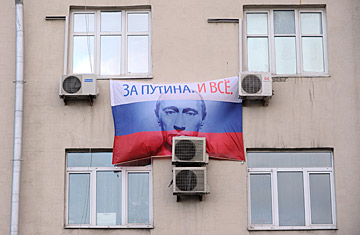
A campaign portrait of Russian Prime Minister and presidential candidate Vladimir Putin bearing the slogan "For Putin! And That's It!" is hung on a building in Moscow on March 2, 2012
(2 of 2)
Putin's third rival is his old friend from their hometown of St. Petersburg, Sergei Mironov, who leads Fair Russia, a socialist party designed by the Kremlin to siphon votes away from the communists. In an interview with TIME last summer, Mironov said that in 2004, he served the role of the "technical candidate" in Putin's re-election campaign. That means he was there to play the role of a competitor in case all of the other candidates decided to pull out of the race. Though Mironov has insisted on his independence in the current campaign, most pundits continue to say that he is doing the same thing this time around.
And then there is Prokhorov, the billionaire owner of the New Jersey Nets, who has never run for office before. His only foray into politics, as head of the probusiness party Right Cause last fall, lasted all of three months, after which he denounced the Kremlin for trying to micromanage the political process like a "puppet master." Prokhorov then said he was taking a break from politics. But when the protests against the government broke out in December, Prokhorov came forward to appeal to the urban, educated middle class, the demographic now rising up against Putin.
On Friday, during his last big campaign event at the Olympic Stadium, Prokhorov presented himself as the candidate of hope and change. "We have to think what kind of country we want to live in," he told a crowd of about 10,000 people. "The one we live in now, or a real European country. A country that is going into the past or a country that his going into the future." But at a press conference just before that speech, he did not exactly seem intent on winning the election. "The question is not so much who wins," he said. "The point is for our government to have legitimacy, for it to be accepted by the people." That hint of defeatism seemed to capture the point of Putin's exercise in democracy.
Practically no one has any doubt that Putin will win a mandate to rule for six more years. According to the latest polls, two-thirds of the voters who have made up their mind are prepared to choose him from among the other candidates on the ballot. The only question is how legitimate that mandate will be. If voters feel that the election was fair, that their votes were counted and had an impact on the outcome, Putin's mandate will have a greater measure of legitimacy. But if allegations of voter fraud overwhelm the announcement of the results, Putin's legitimacy will be eroded. This has now become the goal of the opposition movement.
This week, they began preparing to set up an encampment on a Moscow square to protest the results, which are to be announced on Monday after most of the votes are tallied. "We will have a tent camp!" one of the organizers wrote TIME in a text message on Saturday morning. That is sure to escalate the confrontation between the protesters and the government, which will be tempted to clear the square by force for the first time since the wave of demonstrations began. This standoff marks the only real uncertainty in the election.
On Friday night, the voters who gathered at Olympic Stadium seemed to have accepted this fact. Most of them had gone not to see Prokhorov but to hear the rock concerts he had arranged to entertain them. "Bread and circus," was how Leonid Denisov, a middle-aged businessman, described the show from his front-row seat. If he goes to vote at all, he said, he would probably vote for Prokhorov. "But what's the difference? It's four jesters running against the Czar." That does not make for a very robust competition, which is the ingredient that has been missing in Russia's presidential vote. And without that, it hardly seems deserving of the name.
